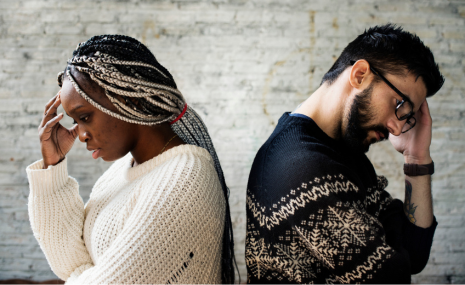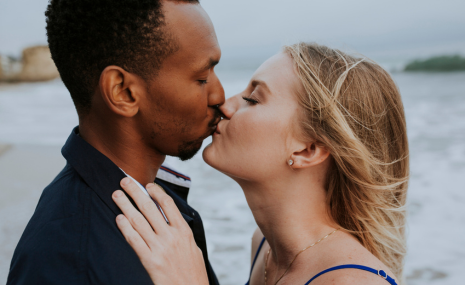I don't like my skin color!!!
 “I don’t like my skin. It’s too dark.”
“I don’t like my skin. It’s too dark.”
Those were the words of a four-year-old black kid who has been adopted by a white parents. Imagine the shock and excruciating pain the mother felt when she was bombarded with the question!
Find your soulmate on InterracialDatingCentral










“Well I don’t like brown skin. I don’t want it,” he continued.
“What kind of skin do you want?” the mother asked.
To which he answered: “Skin like yours.”
No parent would ever want their kids to feel this way. And most parents of mixed race kids and interracial adoptions dread tackling the issues of color. But the way you answer this question, no matter how young the children are, will determine how they deal with the identity issue for the rest of their lives.
What would you do when you realize your kid is not comfortable in his or her own skin? How would you deal with this painful question of confusion?
9 responses to "I don't like my skin color!!!"
Leave a reply
You must be logged in to post a comment.
-

-
 dave_74 says:Posted: 30 Jun 13
dave_74 says:Posted: 30 Jun 13I'm white , but if I could choice a skin color, I'd probably take the deep darkest of black, Sudanese charcoal black that my wife has. Living on the Equator, this really is the best tone if you love the outdoors and don't like that greasy sun screen.
Reply to this comment -
 prettygirl46 says:Posted: 21 Jun 13
prettygirl46 says:Posted: 21 Jun 13I actually wanted to be lighter as I grew up. One of my friends is very light because her family is mixed. We went to the beach because she wanted to get a bit of a tan and I didn't because I didn't want to get too dark. Someone told me in the long run it was better if your skin is a little dark.
Reply to this comment -
 Dasandra says:Posted: 18 Jun 13
Dasandra says:Posted: 18 Jun 13It's sad but true. Parents have to be more proactive in teaching a child about self worth while very young. Giving compliments about skin color and praising others with the same skin color in front of them will help build a security society can't tear down. I wanted to be darker growing up. I was confused about my light skin and eyes. We have to be educated about our differences while we are young.
Reply to this comment -
 Sasejoe says:Posted: 16 Jun 13
Sasejoe says:Posted: 16 Jun 13I grew up hating the color of my skin. Outside of my family, most of my friends were black and latino. It may not be the best answer ever, but it was the answer that worked for me, and that was to learn about who I was ethnically. This allowed me to develop a sense of pride that was separate from the environment that immediately surrounded me. That was when I came to terms with myself.
Reply to this comment -
 AngelfromLA says:Posted: 08 Jun 13
AngelfromLA says:Posted: 08 Jun 13My background is in Sociology and I have done research on interracial and multi-racial dating, marriage and families. This specific situation is where White parents adopted a Black child. This is not a biracial child or a child in a family of Black people who have a variety of complexions. In this case, I believe that this is an opportunity for the White parents to learn how pervasive whiteness is in America. Many White people are not aware that they have social privileges because of their skin color. This baby boy may have already picked-up on it. Also, Whiteness is every where and it is rewarded. In TV ads, books, radio, film, government, EVERYWHERE! This little boy is keenly aware that he is standing out like a sore thumb. It has not dawned on his parents yet. Many White people who adopt Black children make the mistake of believing that this is a Post Racial Society and that diversity is everywhere, when it is not. They also fail to teach their Black children about White Racism because they believe that it no longer exists. This situation, I believe, is more about the parents than it is about the child. Black children raised by Black parents, sometimes don't like their skin color either. As Black people we know that within our own community, we treat people differently based on hue. We are better equipped to walk a child of color through this challenge because we all have some experience with it. But what is a White parent to do when they don't have any experience with being mistreated because of their skin color? What is a White parent supposed to say to their Black child when that parent mistakenly assumed that racism is a done deal and no longer exist? I think that answer is that the White parent just needs to continue to have the conversation with their child because they will learn a thing or two about race and racism. The kid already knows.
Reply to this comment -
 Buzzing20 says:Posted: 06 Jun 13
Buzzing20 says:Posted: 06 Jun 13I would tell them they're skin is beautiful, and they are beautiful/handsome the way they are, and to not let anyone and I mean ANYONE tell them otherwise. Positive reinforcement is how I feel this question should be answered, and after the question is asked, you should let your child know a little bit more often how they're amazing as they are.
Reply to this comment -
 executive..... says:Posted: 05 Jun 13
executive..... says:Posted: 05 Jun 13RIGHT ON!!!!! YOUR FAMILY WILL DETERMINE HOW YOU FEEL ABOUT YOURSELF. SKIN COLOR HAS NOTHING TO DO WITH "WHO WE ARE"
Reply to this comment -
 jod212 says:Posted: 04 Jun 13
jod212 says:Posted: 04 Jun 13As a child of blended grandparents, who's parents had dramatically different skincolors. All I could say is that if a child is valued, have an understanding of genuine self worth, self respect, respect for others and treated like he/she matter's then the variation becomes a point of variety, interest or pride, instead of an issue of shame. I have spoken to many individuals who have similar mixed families and they have said similar experience. There is a conversation with a population of adults that mixed race children will be "confused" or not know who they are. The truth is that it is the adults who are invested in the confusion and disturbed these lovely people exist. Especially when they are mentally balanced and happy young people. The bottom line, good parenting and open communication goes a long way.
Reply to this comment















































I thank God for my parents telling me about both cultures and I have two grown daughters and I am so glad that I gave them positive reinforcement about their culture coming from two Black/Indian. They know the history of both and we celebrate them and by doing that we make others around us aware of who we are. For a child to tell their parent they don't like their skin it only means they failed to see the important of the child's history and cultures.